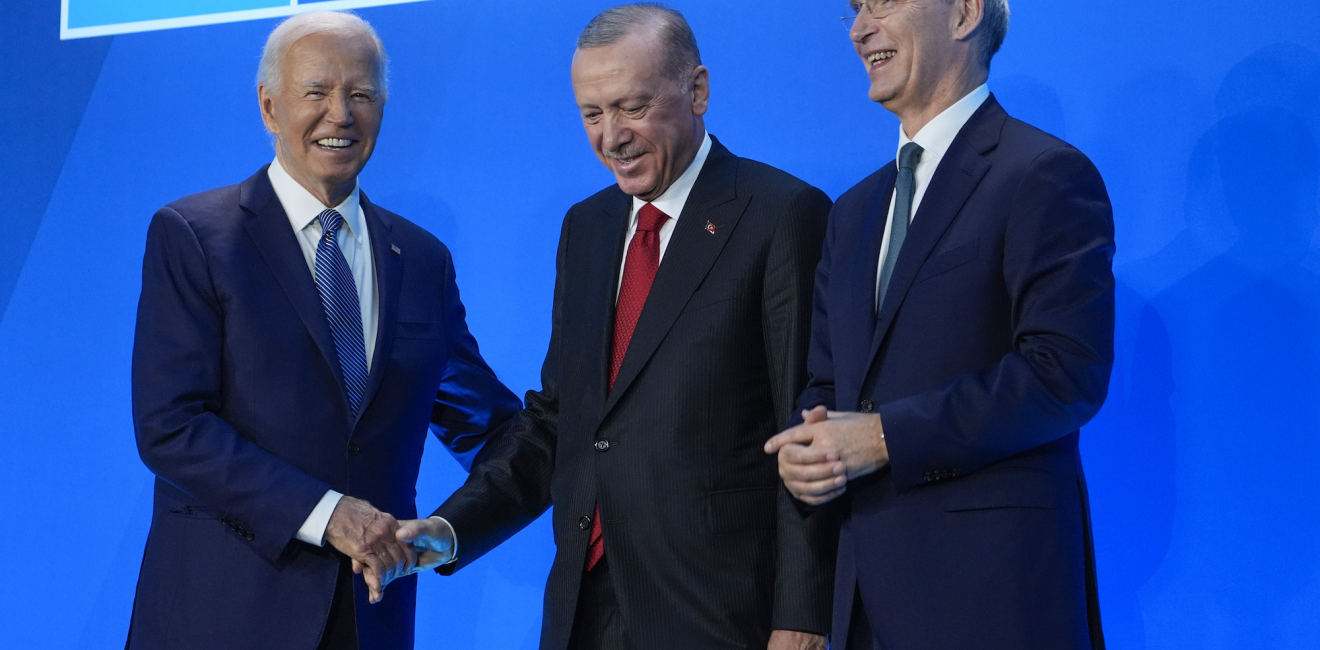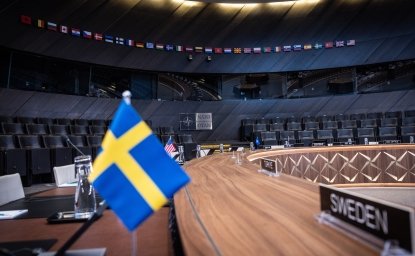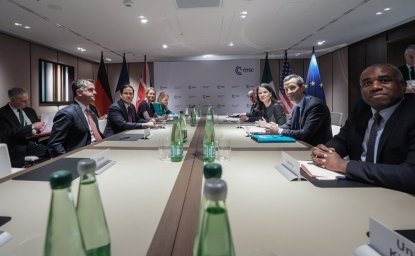At the NATO summit in Washington, DC, Turkey's role in the alliance will be a key topic of discussion, particularly in light of its continued interest in diversifying international partnerships beyond the West. The summit will give Turkish President Recep Tayyip Erdogan the chance to reiterate his commitment to the alliance and reassure NATO members that his cordial relationship with Russian President Vladimir Putin, Turkey’s interest in joining BRICS and the Shanghai Cooperation Organization (SCO), and the delay of Sweden’s NATO membership should not raise concerns about Turkey’s role in NATO.
A nuanced understanding of Turkey's motivations behind the so-called axis shift, including its efforts to diversify strategic and economic partnerships beyond the West and NATO, can mitigate some of these concerns. While acknowledging significant issues with some of the decisions of the Turkish government, such as the S-400 crisis, NATO would gain more by engaging Turkey rather than alienating it, thus maintaining an ally with influence extending beyond the historical borders of the West.
Turkey as a middle power
It is no secret that Turkey's balancing act with a diverse array of, at times, competing nations is not a recent phenomenon but a continuation of long-established policies. This approach has been pursuit of EU (European Union) membership and closer ties with Western countries alongside its engagement with cultural organizations such as the Organization of Islamic Cooperation (OIC).
This dual strategy has been central to Turkey's complex yet advantageous approach to international relations and remains relevant in the current context in an increasingly multilayered world with new intra- and inter-regional partnerships emerging as key actors for trade, security, and governance.
Recently, Turkey’s interest in joining BRICS and the attention drawn by President Vladimir Putin's support has garnered attention and has elicited backlash since Turkey would be the first NATO country to join the organization. However, Erdogan already expressed interest in BRICS membership as early as 2018, during Turkey's first high-level contact with the organization at the 10th BRICS summit in Johannesburg, South Africa.
It is worth noting that Turkish-Russian relations are marked by a complex interplay, featuring both collaborative efforts and opposition in proxy wars.
Diversifying its international partnerships does not signify Turkey's departure from NATO, but its poor decision to purchase the Russian S-400 missile defense system was a significant breach of NATO protocols, causing a major rift within the alliance and leading to discussions about Turkey potentially moving away. This decision not only raised security concerns due to the system's incompatibility with NATO defenses but also suggested a troubling shift towards closer ties with Russia. It is worth noting that Turkish-Russian relations are marked by a complex interplay, featuring both collaborative efforts and opposition in proxy wars.
Economic interests are equally crucial, especially given the country's economic challenges and significant energy dependency on neighbors like Russia, which supplies nearly 50 percent of Turkey’s natural gas needs. Turkey has also been alleged to have helped Russia skirt international sanctions, further complicating its diplomatic relations. Thus, a balanced Turkish foreign policy is more of a necessity than a choice, considering the nation's economic vulnerabilities and strategic geographic location amidst multiple conflicts, ranging from Ukraine and the South Caucasus to the Eastern Mediterranean, Gaza, and the Balkans.
Nevertheless, Turkey's NATO membership and customs agreement with the EU have fostered strong economic and security ties with the West. These connections provide Turkey with strategic tools to leverage when negotiating with BRICS countries and the Global South, reinforcing its position on the global stage.
Although Turkey may lack global influence compared to larger powers, it perceives itself as a significant player in international affairs. Whether hosting talks between Somalia and Ethiopia or securing the grain agreement between Russia and Ukraine, Ankara seeks to bolster its influence and involvement in regional, economic, diplomatic, and security spheres. By positioning itself as a diplomatic bridge capable of engaging with any international entity, Turkey aspires to become an indispensable middle power on the global stage. This strategic approach aims to enhance its regional leadership and global standing, reflecting its ambitions to be recognized as a key diplomatic actor.
Admittedly, Erdogan’s aggressive “neo-Ottoman” foreign policy often overreached, such as in Syria. This approach led to deep and ongoing problems and harmed relations with Syria, the UAE, Egypt, and Saudi Arabia, leading to a series of policy shifts and rapprochements.
Turkey's relationship with China
Turkish foreign policy has also focused on bolstering relationships with China, in addition to Russia and other Middle Eastern nations like the UAE (United Arab Emirates), which at times draws skepticism from NATO allies. This approach, however, can be seen as a strategic necessity rather than a dismissal of alliances.
According to Diren Dogan, a Visiting Lecturer at Oxford University, Turkey's relationship with China has slowly yet cautiously improved against this backdrop. Diren believes there are multiple reasons for this growing interest and willingness to cooperate. Dogan argued that “Foremost among them are contextual changes and the US strategy towards China. While the Ukraine war has underscored the importance of secure trade routes, the US pressure on Western countries concerning China’s rise has prompted China to seek alternative partners.” Consequently, it has shown a cautious interest in various sectors within Turkey, signaling potential avenues for collaboration. However, Dogan underscored, “Given the chronic mistrust between the two countries, the future of Turkey-China relations seems to depend on overcoming this trust issue.”
Turkish Foreign Minister Hakan Fidan’s visit to China in June facilitated discussions on cooperation in tourism, trade, and energy, with Turkey seeking a balanced trade relationship and a diplomatic mediator role between the two worlds. Burak Yildirim, a security analyst at Harici, a think tank based in Istanbul, believes that this visit also allowed both nations to address the Uyghur issue sustainably. Yildirim stated that “China may need Turkey's support to counter international pressure regarding allegations of human rights violations against Uyghur Turks. It is possible to say that Hakan Fidan's visit to Xinjiang also aimed to address this issue.”
During this visit, Turkey proposed collaboration in nuclear energy and evaluated opportunities in precious minerals. Noteworthy progress was made last year in negotiations for Turkey's third nuclear power plant with China, although further developments are expected during a potential visit by Chinese President Xi Jinping to Turkey.
The Chinese side is willing to cooperate in critical infrastructure, telecommunications, 5G, and the defense industry. However, as a NATO country, Turkey remains cautious in these fields, Yildirim argues, indicating an underlying mistrust and the recognition that there is still a long way to go for any significant partnership. Both the SCO and BRICS are international configurations that seek fundamental revisions within the post-WW2 international order, so Turkey joining them would be a huge deal. Beyond its economic return, Cagdas Ungor, an international relations professor from Marmara University in Istanbul, suggests that having close relations with Turkey gives China a public relations opportunity, showcasing a NATO country’s interest in both BRICS and the SCO to both the global south and the West. Ungor added, “Turkey's so-called ‘axis shift’ has PR value beyond economic pragmatics for Beijing.”
As Turkey's economic crisis deepens, its dependence on external sources for employment generation and debt financing increases. Yildirim believes that “unlike Western countries, which have shown a weak tendency to provide the economic support Turkey needs for political reasons, BRICS members, rich in oil revenue, can allocate those financial resources.”
Revitalizing the US-Turkey Relationship
Given Turkey's consistent commitment to NATO, it is unlikely that its actions signify a move away from its Western allies, even in an increasingly multilayered world. Turkey's engagement with non-NATO countries offers opportunities to enhance dialogue, trade, and peaceful conflict resolution. Historically, Turkey has favored a balanced geopolitical strategy, acknowledged by most Turkish governments and the Turkish people. The shift from a unipolar world has led governments to reassess their foreign policies, and Turkey is no different.
Turkey seeks to play a role on various platforms by diversifying its multilateral mechanisms without alarming its traditional allies, including NATO. Its increasing interest in BRICS, the SCO, and other Global South partnerships should be seen as part of this strategy rather than an axis shift. NATO could benefit by having an ally involved in these circles.
Understanding and collaborating with Turkey's perspective can enhance US and NATO relations with Turkey, irrespective of potential administrative changes in Ankara. A revitalized US-Turkey partnership could significantly contribute to securing the Black Sea, especially through coordination with Ukraine, Romania, and Bulgaria. Economically, strengthened US-Turkey relations can benefit the EU by fostering investments in new trade routes.
NATO would benefit from engaging in deeper dialogue with Turkey and understanding the motivations behind its policies.
Recognizing Turkey's strategic maneuvering to expand its economic and geopolitical alliances beyond the West and NATO is crucial for addressing NATO’s concerns. Turkey's pursuit of diverse partnerships should not be misconstrued as an axis shift but as strategic diversification. NATO would benefit from engaging in deeper dialogue with Turkey and understanding the motivations behind its policies.
Despite criticisms of certain Turkish government actions, NATO’s interests are better served by fostering a strong relationship with Turkey. This approach will harness Turkey's influential position, reinforcing the alliance's reach and strength beyond traditional Western boundaries.
The views expressed in this piece are those of the author and do not express the official position of the Wilson Center.








